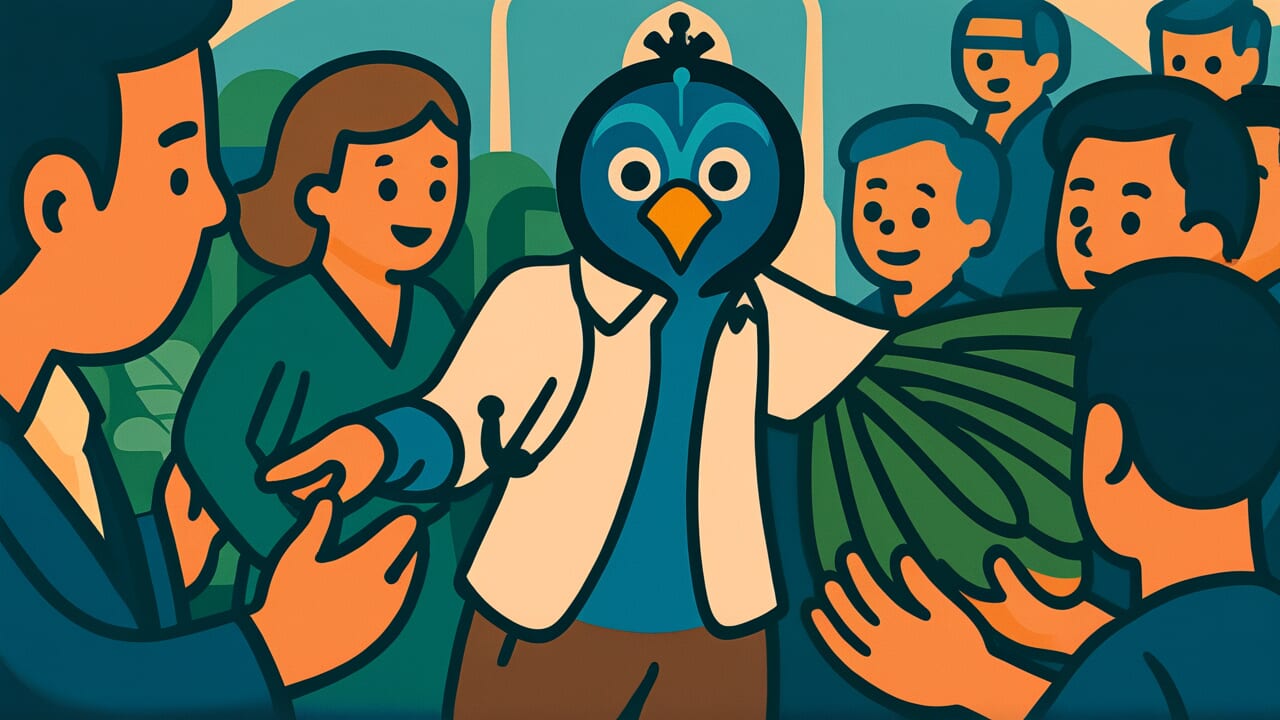How to Read “The peacock is caught by humans because of its feathers”
くじゃくははねゆえひとにとらる
Meaning of “The peacock is caught by humans because of its feathers”
This proverb means that excellent qualities like beauty or talent can sometimes cause misfortune instead of bringing happiness.
Just as the peacock gets caught by humans because of its beautiful feathers, people can also face trouble because of their good looks, talents, or wealth.
These qualities can trigger jealousy or greed in others, which may lead to unhappiness.
People use this proverb when talented individuals get pulled down by jealous colleagues. It also applies when beautiful people become targets of crime.
The saying warns against showing off your strengths too much.
Even today, we see examples everywhere. Some people show off their wealthy lifestyle on social media and become crime targets.
Talented employees sometimes get isolated within their organizations.
This proverb teaches us to recognize the dangers of having excellent qualities. It reminds us to stay humble.
Origin and Etymology
This proverb comes from the fact that peacocks get caught by humans precisely because of their beautiful feathers.
Throughout history, peacock feathers have been treasured as decorative items and craft materials.
The stunning sight of a peacock spreading its tail feathers held great value among rulers and wealthy people.
Peacocks were captured alive or hunted for their feathers.
No clear records show exactly when this proverb was created. However, peacocks became known in Japan during the Nara period or later.
Peacocks came to Japan from China. Nobles treasured these birds highly.
Their beautiful feathers were used for fans and decorative items. This historical background gave birth to the lesson that beauty can bring disaster.
The phrase “because of its feathers” is key to understanding this saying. For peacocks, feathers are tools for survival and a source of pride.
Yet their greatest feature becomes their downfall. This ironic structure forms the core of the proverb.
It contains a deep insight that applies to human society too. Excellent qualities don’t always bring happiness.
Interesting Facts
Peacock feathers were actually traded as luxury goods until the Edo period. A single tail feather sold for a considerable price.
Feathers with beautifully arranged eye patterns were especially valuable. They were used for samurai decorations and Noh theater costumes.
They symbolized wealth and power.
Peacocks spread their feathers to attract females. But these beautiful feathers also make them easier for predators to spot.
Even in biology, there’s an interesting trade-off between beauty and danger.
Usage Examples
- 彼女は美人だから変な人に付きまとわれて、まさに孔雀は羽ゆえ人に捕らるだね
- あの子は才能があるから先輩たちに目をつけられた、孔雀は羽ゆえ人に捕らるというやつだ
Universal Wisdom
This proverb has been passed down through generations because it points out a deep contradiction in human society.
We all want to have something excellent. We want to be beautiful, talented, and wealthy.
But at the same time, we also have complex feelings toward people who possess these excellent qualities. This is human nature.
Admiration sometimes turns into jealousy. Jealousy creates aggression.
The psychology of pulling down excellent people, the desire to possess them, the calculation to use them – these are dark aspects of humanity that never disappear, no matter how times change.
Just as peacocks are born with beautiful feathers, people have qualities they’re born with or talents they gain through effort.
These things are wonderful in themselves. So why do they become seeds of disaster?
The answer is that humans are social creatures. We always live in relationships with others.
We cannot escape comparison and competition. Someone’s excellence stimulates someone else’s sense of inferiority.
This structure itself puts people with excellent qualities in danger.
Our ancestors saw through this cruel truth. They passed it down as a warning to future generations.
Beauty and talent are blessings. But they are also double-edged swords that must be handled carefully.
When AI Hears This
The peacock’s flashy feathers actually prove “I can survive even with such conspicuous feathers.”
According to the handicap principle proposed by biologist Zahavi, having deliberately disadvantageous features can actually demonstrate your excellence.
Males who survive while carrying heavy feathers that make escape difficult send a reliable signal. They must have high abilities in other areas.
This functions as an unforgeable proof system. Anyone can say “I’m excellent” with words.
But the fact of surviving while carrying a handicap cannot lie. Weak individuals who try to imitate cannot bear the cost and get eliminated.
Research confirms that males with magnificent feathers actually have higher disease resistance and better genetic quality.
Humans can catch peacocks because this “high-cost signal” doesn’t work against unexpected threats.
Evolution optimized for competition within the same species and natural predators. Humans with traps and guns were outside the calculation.
A strategy that was optimal in one environment suddenly becomes a weakness when the system’s assumptions change.
This has the same structure as talented people becoming easy targets in new environments.
Lessons for Today
This proverb teaches you about the balance between humility and self-protection.
In today’s social media age, we can easily share our success and happiness. But that information might put you in danger in unexpected ways.
Having talent, beauty, or wealth is wonderful. But you need wisdom in how you handle these things.
The important thing is not to deny your strengths. Rather, treasure them while being thoughtful about how you show and use them.
If you achieve outstanding results at work, also praise your team’s contributions.
If you’re in a privileged environment, don’t take it for granted – be grateful.
If you have beauty or talent, use it as a power to help people, not as a tool to hurt them.
This proverb isn’t telling you to be timid. It wants you to recognize your value while being aware of how it affects those around you.
Shine while staying humble. Be strong while being kind.
When you can live this way, your beautiful feathers won’t be a disaster. They’ll become a true blessing.



Comments